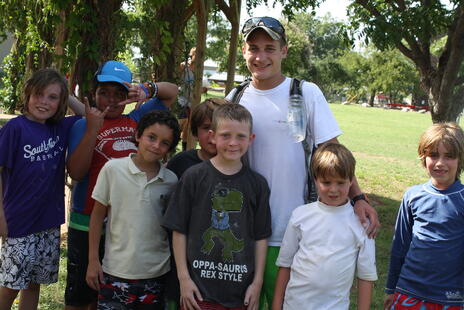Effective Discipline Techniques for Children: Part 3
This Blog is Part of our Counselor Training Series, see note below*
[In Part 2 we discussed how to address disciplinary situations in a way that helps kids learn. In Part 3, we discuss what we do about chronic misbehavior that is not improving.]

What About Chronic Disciplinary Issues?
In the case of chronic misbehavior, we need to change our approach because the first has obviously not been very effective. We still want to recognize the cause of the misbehavior, whether a skills deficit or an unmet need, but we need to augment the question-based approach. The following are all strategies that we use in the rare cases when a camper has not learned from our previous efforts to address his or her behavior.
*One important note is that this is the point at which counselors are expected to bring the issue to a member of the Leadership Team—either a Division Leader or a Director. They are welcome to ask for help before this stage, but are required to once the misbehavior becomes chronic. This assures that we give the camper the very best chance to improve, or, if necessary, have followed the correct steps to decide that a camper must be sent home.
Attach a consequence
For first offenses, consequences are usually reactionary and may not even be necessary after a good talk with a counselor about what went wrong and how to avoid the situation in the future. But for chronic misbehavior, it is important to attach some kind of consequence to which the camper agrees so that the results of the misbehavior are understood. This frees the camper from the temptation to judge the consequence as unjust—it was agreed to beforehand, after all. We have also found it effective to have counselors participate in the consequence with the camper, when possible. This also removes any temptation to think that the counselor is being unfair, which would limit the camper's ability to learn from the experience.
Timing matters
We teach counselors to respond to disciplinary situations as they arise, unless the camper needs time to cool off and get into the mindset where he or she can discuss what happened. Otherwise, putting something off until later can cause all kinds of problems, including allowing hurts to fester and campers being confused about why disciplinary action is being taken now. Also, addressing misbehavior immediately reduces the risk that it will build and build into a bigger problem later. It’s always easier to take care of something right when it comes up.
Address the behavior, but don't forget to love the camper
It should not be difficult for an emotionally grounded adult to separate the behavior from the child and work only on the behavior. The child doesn't need to be fixed, he or she just needs to be taught how the behavior can be fixed. Approaching discipline this way sends the child a clear message: I still love you, but I expect you to be able to control your behavior, and I know you have the power to do so. Every child needs to feel cared for, and this extra effort to separate the behavior from the individual may be just the thing that the camper needs to learn to see in him- or herself.
When to send a child home
We believe that every camper can be successful at Camp Champions, but there is also a time that his or her behavior becomes a problem for the other campers at camp. Most campers look forward to camp all year, and we never want one difficult cabinmate to ruin a summer for another child.
As soon as misbehavior is identified as chronic and it is brought to our leadership team, the Division Leader of that age group will give the parents a call to let them know what is going on and to ask for advice on what works at home. Parents know their kids better than anyone, after all. Together we will come up with a plan, including telling the camper exactly what will warrant sending him or her home. That way, we once again put them in charge of responsibility for their own actions, and the consequences are made clear.
This happens very rarely, but we are committed to making Camp Champions a safe place for all campers, and if one is negatively affecting an entire cabin and shows no signs of improvement, it is our responsibility to the campers who are making the most of their time at camp to to send the first home.
Thanks for reading about how we address discipline at Camp Champions, and if you have any questions please don't hesitate to call! If you would like to learn more about how future success, including college and career readiness can be impacted through the development of non-cognitive skills, such as those learned at summer camp, please explore the link below:
* We believe that the way we train our counselors is among the best in the country. We are writing this blog series to share parts of what we teach during our 12-day orientation, so that you can feel secure in trusting your child to the supervision of our counselor role models.
See the full series here: Counselor Training Series


